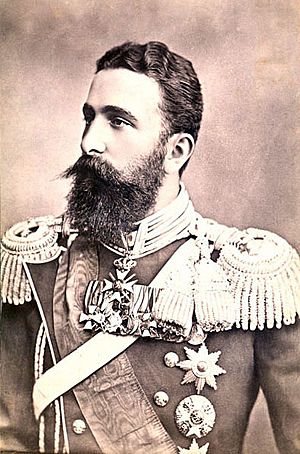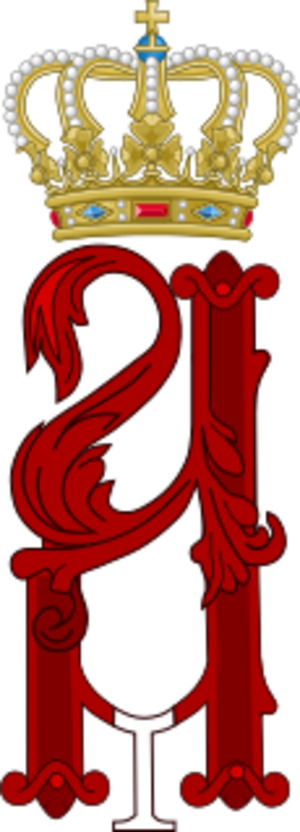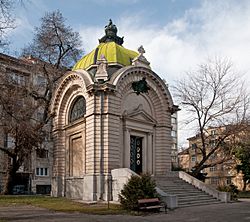Alexander of Battenberg facts for kids
Quick facts for kids Alexander I |
|||||
|---|---|---|---|---|---|
 |
|||||
| Prince of Bulgaria | |||||
| Reign | 29 April 1879 – 7 September 1886 | ||||
| Predecessor | Vacant (previously Constantine II) |
||||
| Successor | Ferdinand I | ||||
| Born | 5 April 1857 Verona, Kingdom of Lombardy–Venetia, Austrian Empire |
||||
| Died | 17 November 1893 (aged 36) Graz, Duchy of Styria, Austria-Hungary |
||||
| Burial | Battenberg Mausoleum, Sofia | ||||
| Spouse | Johanna Loisinger | ||||
| Issue |
|
||||
|
|||||
| House | Battenberg | ||||
| Father | Prince Alexander of Hesse and by Rhine | ||||
| Mother | Julia, Princess of Battenberg | ||||
| Religion | Lutheran | ||||
Alexander Joseph (born 5 April 1857, died 17 November 1893), also known as Alexander of Battenberg, was the very first prince of the Principality of Bulgaria. He ruled from 1879 until he gave up his throne in 1886.
Bulgaria's Grand National Assembly chose him as their prince in 1879. He faced many challenges trying to lead the new country. He even suspended Bulgaria's first constitution for a while, which made him popular with some people but caused problems with Russia. He also helped unite Bulgaria with another region called Eastern Rumelia in 1885.
Contents
Early Life of Prince Alexander
Alexander was the second son of Prince Alexander of Hesse and by Rhine and Julia, Princess of Battenberg. His mother's family was given the title of Princess of Battenberg.
He was a nephew of Russia's Tsar Alexander II. This connection was important later in his life. His family called him "Sandro" or "Drino."
Alexander's brother, Prince Louis of Battenberg, married Princess Victoria of Hesse and the Rhine. She was a granddaughter of Queen Victoria of the United Kingdom. Their children included Queen Louise of Sweden and Earl Mountbatten of Burma. Another child was Princess Alice of Battenberg, who was the mother of Prince Philip, Duke of Edinburgh. Prince Philip was the husband of Queen Elizabeth II.
Another of Alexander's brothers, Prince Henry of Battenberg, married Queen Victoria's youngest daughter, Princess Beatrice of the United Kingdom. Their daughter, Victoria Eugenia, became Queen of Spain.
Becoming Prince of Bulgaria
As a young man, Alexander often visited Saint Petersburg, Russia. He even joined his uncle, Tsar Alexander II, during the Bulgarian campaign in 1877.
After the Treaty of Berlin in 1878, Bulgaria became a new, self-governing country. The Tsar suggested his nephew, Alexander, as a leader. The Grand National Assembly of Bulgaria then chose Prince Alexander as their first prince on 29 April 1879.
Before going to Bulgaria, Alexander visited the Tsar and other important leaders. A Russian warship took him to Varna. He took an oath to the new constitution in Veliko Tarnovo on 8 July 1879, and then traveled to Sofia. People were very excited to see him everywhere he went.
Alexander had no experience leading a country. He found himself in a difficult spot. Russia wanted him to be a weak ruler, but Bulgarian politicians had strong disagreements among themselves. This made it hard to keep the country stable.
In 1881, Alexander decided to take full control of the country. He suspended the constitution, believing it was too liberal. However, this move made many Bulgarian politicians angry. Real power then shifted to two Russian generals. After trying to get the generals removed, Alexander brought back the constitution in 1883. This caused a serious disagreement with Russia.
Uniting Bulgaria and War
A big event happened in Plovdiv on 18 September 1885. This was the union of Eastern Rumelia with Bulgaria. Prince Alexander agreed to this and quickly took charge of the new, larger province.
In the next year, Alexander showed he was a skilled military and diplomatic leader. Russia removed its officers from the Bulgarian army. Alexander quickly replaced them with Bulgarian officers. He prepared the army to fight against a Serbian invasion. This war was later called "The Victory of Bulgarian Cadets vs. Serbian Generals."
Alexander quickly moved his troops from the Turkish border to Slivnitsa. He ordered them to build strong defenses there. He then led his troops to victory at the Battle of Slivnitsa on 19 November. He chased the Serbian King Milan's army deep into Serbian territory, capturing Pirot.
Even though Austria stepped in to protect Serbia, Alexander's success made the union with Eastern Rumelia permanent. After long talks, the Ottoman Sultan agreed to make Alexander the governor-general of Eastern Rumelia for five years.
Losing the Throne
This agreement made Alexander less popular in Bulgaria. Some of his officers were also unhappy. These officers, encouraged by Russia, formed a secret plan. On the night of 20 August 1886, they captured the prince in his palace in Sofia. They forced him to sign a paper giving up his throne. They then took him to the Danube and handed him over to Russian authorities.
However, Alexander soon returned to Bulgaria. This was because of a counter-revolution led by Stefan Stambolov. Stambolov's group overthrew the temporary government set up by the pro-Russian group. But Alexander's position was still very weak. He had sent a poorly thought-out message to Tsar Alexander III. Also, other powerful countries like Germany and Austria did not want him to punish the officers who had plotted against him.
So, Alexander decided to give up his throne for good. He left Bulgaria on 8 September 1886. After this, he used the title Prince of Tarnovo.
Later Life and Legacy
Alexander then lived a private life. He married an actress named Johanna Loisinger. They had a son, Assen, and a daughter, Tsvetana. He took the title of Count von Hartenau.
He spent his last years mostly in Graz, Austria. He worked as a general in the Austrian army. He died on 17 November 1893, at the age of 36. His body was brought back to Sofia, Bulgaria, for a public funeral. He was buried in a special building called the Battenberg Mausoleum, built to honor him.
Prince Alexander was known for his charm and good looks. Many people recognized his skills as a soldier. As a ruler, he made some mistakes, but he was young and new to the job. He was good at understanding people and situations, which helped him deal with tricky politicians.
Honours
Battenberg Hill on Livingston Island in Antarctica is named after Prince Alexander Battenberg of Bulgaria.
He founded and was the Grand Master of several Bulgarian orders:
- Order of Bravery, 1 January 1880
- Order of St. Alexander, 25 December 1881
- Order of the Bulgarian Red Cross, April 1886
He also received many honours from other countries, including:
- Austria-Hungary: Grand Cross of the Imperial Order of Leopold, 1879
- Denmark: Knight of the Elephant, 6 July 1883
- French Third Republic: Grand Cross of the Legion of Honour
- Russia: Knight of St. George, 4th Class, 1 August 1877
- United Kingdom of Great Britain and Ireland: Honorary Grand Cross of the Bath, 6 June 1879
See also
 In Spanish: Alejandro I de Bulgaria para niños
In Spanish: Alejandro I de Bulgaria para niños
- History of Bulgaria
- Battenberg Mausoleum
- Prince Alexander of Battenberg Square
 | Chris Smalls |
 | Fred Hampton |
 | Ralph Abernathy |



